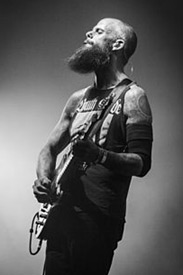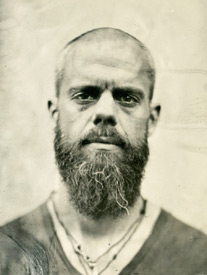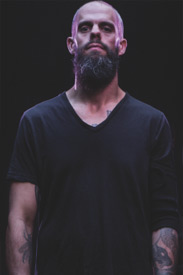|
Interview conducted June 8 2018 Interview published June 18 2018 |
![]()
"…if you make a record full of songs that are presented in a way that nobody's ever heard before, chances are it's gonna be a little tricky to listen to."
American sludge metallers Baroness are currently out in Europe for a bunch of festival gigs and some headliner shows in between and as the band came to Sweden Rock, Metal Covenant got some time to talk with the band's undisputed leader, vocalist and guitarist John Baizley.
![]()
Tobbe: You've got 5 albums and a couple of EPs out by now and do you think that it's already getting difficult to come up with completely new or different things?
John: No, I don't think it's hard to come up with new things. I think the difficulty for a band like this, and this has been a difficulty since we started, really is that we don't wanna be a repetitive band. You know, we wanna grow and I mean our goal is to write better and better music as we get older, but at the same time I think it's a healthy habit to keep an eye on the past and make sure that you don't lose your sense of identity.
The difficult thing, I think, for any artist who's playing music is to understand what it is about their music that makes it theirs, because we play a format that everybody plays. You know, we got two guitars, we have a bass player, we have a drummer and, you know, somebody shouting in a microphone. There's nothing now about that.
The challenge for us, and I assume for many bands out there, is to come up with a way to keep that interesting as time goes on, because even at the point when they started, the greatest things in rock 'n' roll that ever were going to be said had been said, you know. The '70 was a really fruitful time for this format of music, so in a way we're not at the beginning of the history of this; we're somewhere stuck in the middle and trying to figure out what it is that keeps our music contemporary and keeps ourselves moving forward as musicians.
Tobbe: Is it important to you personally to come out with music that is unique in a sense?
John: Yeah, absolutely. I mean, I think the idea of coming out with unique is a really difficult one, because if it's truly unique, if you make a record full of songs that are presented in a way that nobody's ever heard before, chances are it's gonna be a little tricky to listen to. But neither can you copy somebody else's songwriting entirely, because that's… you know, what's the point?
So finding a place in the middle there is what's really critical, because music is a wonderful way for us to communicate ideas and, you know, concepts and our philosophy to an audience, oftentimes I consider us a live band, and to have some of that reflected back towards us… you know, our show gets better as our audience gets more involved and excited and interested. It's great to me 'cause I still feel a slight tinge of anxiety before we play 'cause I wanna do the best thing we can do. And it's still exciting, it's still challenging, it's still work in a constructive way, you know what I mean?
Tobbe: In the end, will you kind of run out of colors to name your album by? Have you thought about breaking that naming process at some point?
John: Yes, I have. I've talked about it many times. [Laughs] Time will tell on this one though.
 Tobbe:
In which way would you say that you intentionally try to develop your
music?
Tobbe:
In which way would you say that you intentionally try to develop your
music?
John: Yeah, we intentionally try to develop our music, but not to the point where our intentions outweigh the quality in what we're doing. You know, it's not fun to rewrite a song that you've written and just tweak a few things so that "Oh, this is definitely a different song, but it follows the same format as another one.". It's also sort of impossible not to do that sometimes, so, you know, this is where our judgment and our taste come into play.
We have to feel that it's progressing without distancing itself from our original intent. You know, it's gotta be difficult for everybody; writing in your own style: easy. You gotta get all the people in your group together and synchronize them on one path and just cross fingers and hope that everybody likes it. What I will say though is, I learned a long time ago, maybe even before the band started, that we should never write music for our audience; we need to write music for ourselves.
The goal is to write an album that we want to hear, that we haven't heard yet, because when we do that our enthusiasm and creativity is operating in such a high level that I assume that that moves over to the audience, and then they pick that up and what's enjoyable about the record is that the band making it sounds as if they're inspired. I mean, that's the goal.
Tobbe: Baroness's music is kind of retro, I would say.
John: Yeah, a hundred percent, there's elements. We don't shy away from the fact that there's elements of our sound that celebrate metal, or punk, or hardcore, indie or hiphop. It doesn't really matter, like, you know, you beg, borrow and steal from all these records that you've heard, these great ideas, but you just make the idea your own, presented in a way that's yours, you know.
 Tobbe:
When you first started out making your own music, what did you try to
accomplish back then?
Tobbe:
When you first started out making your own music, what did you try to
accomplish back then?
John: When we first started, part of it was that as musicians we were young, so in a certain way I think every musician thinks what they're doing is really more unique than maybe it is. But that's really all you need, like whether or not it's unique is kind of irrelevant at that point. If you think it is then you're approaching it in a fresh way and you don't apply these rules to it. You know, "Led Zeppelin would stop at this point and then change sections and then it would be chorus." and "Fuck that! Our chorus starts whenever it wants to.".
And initially when we started, we really avoided writing, like, standard formats, so it wouldn't be like A, B, A, B, solo, B. You know, not verse, chorus, verse, chorus. It was just more like A, B, C, D, E, F, G. You know, just keep stacking parts on one another. And then when we had done that enough it was like "Okay, well, this is a pattern. We gotta break this pattern. Let's try to write music that does have 2 or 3 choruses and solo." and that was difficult for us; that was a new thing for us back then.
Tobbe: About your personal development. Have you ever been using a vocal coach or anything?
John: I have had the great fortune of working with an incredible vocal coach, a women called Melissa Cross, and she and I have developed a great friendship over the past couple of years. And the primary reason I saw her was because I just didn't wanna lose my voice on tour anymore and I was taught more about the physiology of a voice than about how to actually use it. Because I can use my voice; you know, you're heart is in your voice. There's something there that I respond to, that your fans obviously respond to.
We wanna keep that instrument intact and at that point I realized that it's the one instrument that I have at my disposal that I've never learned anything about. I know every part of my guitar, I know how to fix a guitar, I know how to retool it and make it sound however I want; I don't know how to do that with my voice. So, when I began to think about my voice as an instrument…
You know, I never really considered myself a vocalist, ever, but then once I became confident enough to realize that that's a very critical and important part in our music, I took it more seriously and since learning more about my own voice I've had much more fun performing and playing music. Because I've learned that I can do more things than I thought I could and part of this band is always recognizing, you know, what the line of our capabilities is and then taking it one step beyond that and to a place where it's uncomfortable, and then that pushes that capability just one step further in that we're trying to do something.
You know, that's how you grow, as a human. It's not unique to music; no matter what you do, that's what happens for you.
Tobbe: And if you don't like a turn, you can maybe take a turn the other way.
John: Yeah, and that's the other thing about Baroness. I've never particularly felt like we fit easily into one genre definition. And that's great for me, because it means we can take risks that probably will fail, we can do things that probably won't work out in the long run, but we do it with enthusiasm and we do it because we want to and if it fails, you know, fuck it, whatever. The sound is not a linear thing for us; it needs to be broad and radiate from center and outwards.
I think that gives us the right to do whatever we want. It also makes things very difficult, because I think, you know, if you're a metal band you play capital H heavy metal, soaring vocals, huge leads and then that's all you gotta do; you just work within that format and try to be better and better. We're not exactly any of that, so "Good luck!" to our marketing department trying to figure out who we should play with.
But I love it, because we get to play, like, a festival like Sweden Rock, which is more hard rock and metal focused, but we can also have the same experience at, like, a Roskilde type of thing. We can play in clubs, we can play in arenas and it seems like it works. It seems like we can figure out a way to make everything work. As long as it's not repetitive, I'm happy, you know. Just don't wanna do the same thing every day.
 Tobbe:
If we look at your paintings and stuff. How much time do you basically
put down to paint a cover for an album?
Tobbe:
If we look at your paintings and stuff. How much time do you basically
put down to paint a cover for an album?
John: [Laughs] Hundreds of hours. Yeah, it takes a lot. I mean, every time I do it it's a massive project. I think in the best years of my life I can say that I split my time pretty evenly between music and art.
Tobbe: As you grow older, will you maybe paint more and create less music, if you know what I mean?
John: I assume that's the way it's gonna go. I mean, that feels like the natural way of things. So for the time being I'm spending a little bit more time on music because, I'm not stupid, I know that if you're in a band you have a lifespan that, you know, is gonna end, but as an artist in general, you know, you can work 'til you die.
Tobbe: Are there many offers from other bands that want your paintings, or collectors or just regular people wanting to buy your stuff?
John: Yeah. I mean, I consider myself beyond fortunate, because people do seem to want the things that I've made. I'm happy to say I normally have more work that I can take on; I'm unhappy to say that I normally commit to more things that I can actually accomplish. So, I feel like I've just been running a marathon for the past 15 years, that probably won't end. [Laughs] But I enjoy it. You know, the process, the stress, the constant workflow. That works for me. When I have free time I don't know what to do with it.
Tobbe: Is there a greater chance that you come out with things that are even more unique when you paint than when you make music?
John: I don't know. I think in the arts. I mean, visual arts, musical arts, theatric arts; you know, whatever you're doing. Being a true original is a difficult thing. It's a difficult road to follow, because as you close in on truly unique… that's kind of an alienating thing. The people out there that are making things that only they make… it's usually kind of twisted up, it's dense, it's angular, and it's kind of hard to view or listen to and it takes some work to understand it. But understanding the place in the great river of musical history and the history of visual arts and using points of familiarity, I think allow your audience that easier entry point.
And that's just what happens when I make music. It's music that has elements of familiar music in it. When I make art you can tell what I'm making a picture of. So that's how I, as an artist, learned how to draw people in. And then that uniqueness might be just below that superficial level; just below the surface. If you have a point, if you have an idea, or a point you're trying to get across… that's been, for me, the easiest way to express that. And that's just a personal thing, you know.
Tobbe: You seem to have a clear vision of what you want to do.
John: It seems like I have a clear vision, yeah. But I mean, the big secret is I don't think like this while I'm making something. You know, when I'm making something I'm reacting; it's instinct. I think I can confidently say that that sort of stuff that I make is very emotionally based. I can't think about it; I look back on it and I can analyze it and critique it and I can tell you how things have worked, but I can never tell you how things will work. It's just not the nature of this game for me.
Tobbe: Since you're the only original member left in the band, are you sometimes hard to work with?
John: I hope not, you know. I founded this band and one of the basic principles on which I work is I refuse to experience any success based on somebody else's work. I will never do anything intentionally rude, I don't lie, I don't cheat, I don't believe in quick success; I think hard work is the key. If anything is hard to deal with with me, it's that I believe that there is no time limit on how long it takes to make something great. It could be 5 minutes, it could be 5 months, it could be 5 years and I'm grateful to everybody that follows me on the journey, because… [Whispers] I also know I'm a little bit crazy, and that's probably what it is, you know. [Laughs]
Related links:
www.yourbaroness.com
www.facebook.com/yourbaroness
![]()